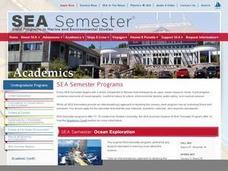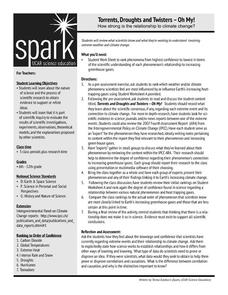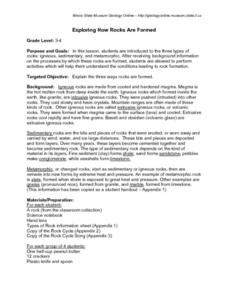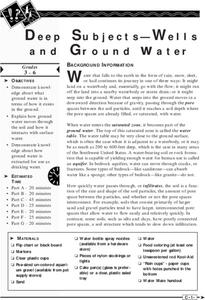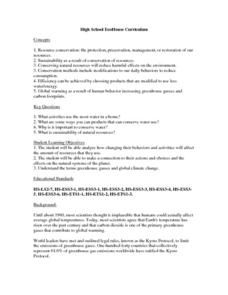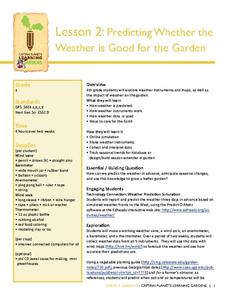Space Awareness
The Intertropical Convergence Zone
Young scientists know it is hotter along the equator, but why is it also rainier? Through the process of completing two experiments and a worksheet, scholars discover the answer is the intertropical convergence zone. First, they...
Science 4 Inquiry
Let's Get Moving
Rivers top the list of causes of erosion over time. Scholars experiment with wind, water, and ice reshaping sand. They connect the simulations facts about erosion and deposition to understand unique landforms such as the Grand Canyon and...
Curated OER
Igneous Rocks
High schoolers focus on a study of igneous rocks. They see how igneous rocks are formed, and how to distinguish them from other types of rocks. A crystal-growing activity is present, and learners create drawings that show where each...
National Geographic
Expedition Clothing Then and Now
Introduce your class to the Everest expedition to reenact a 1924 climb by George Mallory and Andrew Irvine. Discuss and show pictures of the types of clothing worn at that time and compare it to today's state-of-the-art climbing gear....
Channel Islands Film
Island Rotation: Lesson Plan 3
How far have California's Channel islands moved? What was the rate of this movement? Class members first examine data that shows the age of the Hawaiian island chain and the average speed of the Pacific Plate. They then watch West of the...
Curated OER
Seein' Double, Seein' Double
By using the Internet, hands-on activities, video, and cooperative learning, pupils look into the conditions in which light casts shadows on objects. The lesson includes fabulous hands-on activities, art projects, worksheets, and reource...
Curated OER
The Hydrologic (Water) Cycle
Learners construct a model of the hydrologic cycle, and observe that water is an element of a cycle in the natural environment. They explain how the hydrologic cycle works and why it is important, and compare the hydrologic cycle to...
Curated OER
Sampling the Ocean Floor
Learners sample goodies from an unseen ocean floor and try to accurately describe their composition. This simulation helps students explain the limitations of sampling and the problem of obtaining representative samples of sea floor...
Curated OER
Real Ice Ages Longer Than Movie Ice Ages
If your class's knowledge of the Ice Age is limited to animated movies, use this lesson plan to strengthen their knowledge. After sharing what they know about the Ice Age, young readers explore a news article seeking to dispel...
Center Science Education
Torrents, Droughts, and Twisters - Oh My!
What is causing the extreme weather happening around the planet? Middle and high schoolers read about climate change as a possible link to such phenomena. Then they form groups to discuss and research one of the types of weather events....
Chicago Botanic Garden
Historical Climate Cycles
What better way to make predictions about future weather and climate patterns than with actual climate data from the past? Young climatologists analyze data from 400,000 to 10,000 years ago to determine if climate has changed over time....
Science 4 Inquiry
Layers and Laws: The Law of Superposition and Index Fossils
What can layers of rock teach us about the climate? Young scientists solve a mystery about who stole a cookie by applying the law of superposition. Then, they apply the same concept to solve a more difficult mystery, trying to determine...
Curated OER
Exploring How Rocks Are Formed
These lessons produced by the Illinois State Museum are quite good. In this one, third and fourth graders are introduced to the three basic types of rocks: igneous, sedimentary, and metamorphic. They perform activities which help them...
Curated OER
Moh's Hardness Test
Young geologists utilize Moh's hardness scale to help them correctly sort and classify different types of rocks. This lesson has everything you need, including an excellent example of the Mohs' Hardness Test, to successfully implement...
Curated OER
Neither Wind Nor Rain
Here is another in the interesting series of lessons that use the special State Quarters as a learning tool. This one uses the North Dakota State Quarter. During this lesson, your class learns about the different patterns of erosion, and...
PricewaterhouseCoopers
Conservation: Water
Here is a fantastic experiment-based lesson on water conservation, waste, and filtration. The lesson plan is well-developed and provides background information, discussion leads, and six scripted lab activities anyone can do. The class...
California Academy of Science
Global Climate Change and Sea Level Rise
Ice is nice, and its condition on the planet has a significant effect. Junior geoscientists experiment with ice melting in both water and on land to discover how each affect the rising sea level. This detailed lesson outline even...
NOAA
What Little Herc Saw
See the underwater world through a different pair of eyes! Middle school marine biologists identify deep-sea organisms by examining images taken by an ROV from the Okeanos Explorer. After determining what creatures lie beneath the...
Curated OER
Deep Subjects - Wells and Ground Water
Here is a phenomenal lesson plan on ground water, wells, and aquifers. Young geologists study how water exists underground, how water moves through the soil, and how water is extracted to be used as drinking water. Some excellent...
Curated OER
The Formation of Coal
In this coal formation worksheet, students read and informational sheet about coal formation. Students are given 5 short-answer questions regarding what they've read.
Curated OER
The Water Cycle
Observe the stages of the water cycle by completing 3 activities. To help understanding of the water cycle your students can observe evaporation, the formation of frost, vapor and water and the process of distillation which is used to...
Curated OER
High School EcoHouse Curriculum
How has the level of carbon dioxide changed over recent years, and what is contributing it? Groups work together to research and present their findings in a creative way. Also built into the lesson is a visit to a sustainable house, but...
Captain Planet Foundation
Predicting Whether the Weather is Good for the Garden
Can your class predict the weather? Show them how they can come close with a lesson about creating weather instruments, including weather vanes, barometers, wind socks, anemometers, and thermometers. Kids research weather patterns and...
Curated OER
Understanding the Water Cycle
Investigate the water cycle and how water moves from the land to the air and back to the land. Create a terrarium and observe the water cycle at work. Define weather terms including evaporation, condensation, and precipitation.
Other popular searches
- Earth Science Moon Phases
- Branches of Earth Science
- Earth Science Minerals
- Earth Science Inquiry
- Earth Science Lesson
- Earth Science Lesson Plans
- Basic Earth Science
- And Earth Science
- Earth Science Map Reading
- Earth Science and Art
- Earth Science Vocabulary
- Science Earth Layers









